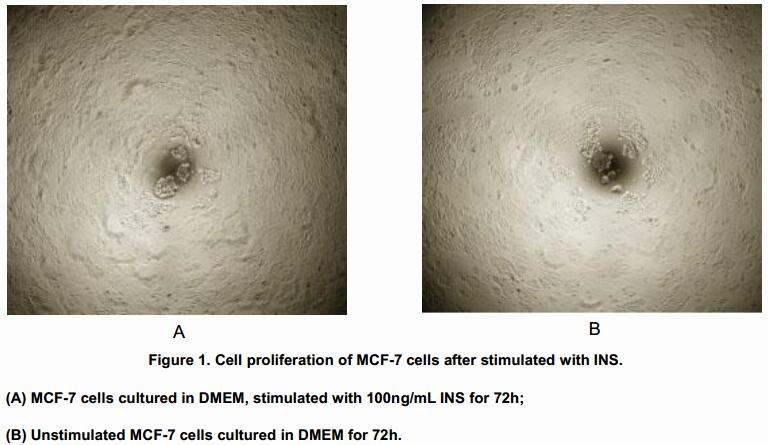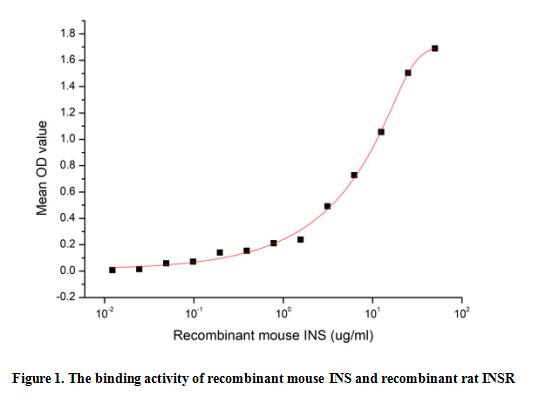Active Insulin (INS)
- Product No.UAPA448Mu01
- Organism SpeciesMus musculus (Mouse) Same name, Different species.
- Buffer Formulation20mM Tris, 150mM NaCl, pH8.0, containing 1mM EDTA, 1mM DTT, 0.01% SKL, 5% Trehalose and Proclin300.
- TraitsFreeze-dried powder
- Purity> 90%
- Isoelectric Point7.1
- ApplicationsCell culture; Activity Assays.
- Download Instruction Manual
- UOM 10µg50µg 200µg 1mg 5mg
-
FOB
US$ 100
For more details, please contact local distributors!US$ 250
For more details, please contact local distributors! US$ 500
For more details, please contact local distributors! US$ 1500
For more details, please contact local distributors! US$ 3750
For more details, please contact local distributors!
ACTIVITY TEST of the Active Insulin (INS)

INS (Insulin) is a peptide hormone produced by beta cells of the pancreatic islets, which decreases blood glucose concentration and increases cell permeability to monosaccharides, amino acids and fatty acids. It has been reported that insulin triggers phosphorylation of a number of substrates by binding to its receptors, which was important for cell proliferation, cell cycle progression, cell division and differentiation. To detect the effect of Insulin on cell proliferation, MCF-7 cells were seeded into triplicate wells of 96-well plates at a density of 2,000 cells/well and allowed to attach overnight, then the medium was replaced with serum-free standard DMEM prior to the addition of various concentrations of INS. After incubated for 48h, cells were observed by inverted microscope and cell proliferation was measured by Cell Counting Kit-8 (CCK-8). Briefly, 10µL of CCK-8 solution was added to each well of the plate, then the absorbance at 450nm was measured using a microplate reader after incubating the plate for 1-4 hours at 37°C.

The dose-effect curve of INS was shown in Figure 2. It was obvious that INS significantly promoted cell proliferation of MCF-7 cells. The ED50 for this effect is typically 11.71 to 57.11 ng/mL.

Insulin (INS) is a polypeptide hormone originating in the beta cells of the pancreas and serving as a principal regulator for the storage and production of carbohydrates. Insulin decreases blood glucose concentration. It increases cell permeability to monosaccharides, amino acids and fatty acids. It accelerates glycolysis, the pentose phosphate cycle, and glycogen synthesis in liver. Besides, Insulin Receptor (INSR) has been identified as an interactor of INS, thus a functional binding ELISA assay was conducted to detect the interaction of recombinant mouse INS and recombinant rat INSR. Briefly, INS were diluted serially in PBS, with 0.01% BSA (pH 7.4). Duplicate samples of 100 ul were then transferred to INSR-coated microtiter wells and incubated for 2h at 37℃. Wells were washed with PBST and incubated for 1h with anti-INS pAb, then aspirated and washed 3 times. After incubation with HRP labelled secondary antibody, wells were aspirated and washed 3 times. With the addition of substrate solution , wells were incubated 15-25 minutes at 37℃. Finally, add 50 µL stop solution to the wells and read at 450 nm immediately. The binding activity of of recombinant mouse INS and recombinant rat INSR was shown in Figure 1, the EC50 was 8.68 ug/ml.
USAGE of the Active Insulin (INS)
Reconstitute in 20mM Tris, 150mM NaCl (PH8.0) to a concentration of 0.1-1.0 mg/mL. Do not vortex.
STORAGE of the Active Insulin (INS)
Avoid repeated freeze/thaw cycles. Store at 2-8°C for one month. Aliquot and store at -80°C for 12 months.
STABILITY of the Active Insulin (INS)
The thermal stability is described by the loss rate. The loss rate was determined by accelerated thermal degradation test, that is, incubate the protein at 37°C for 48h, and no obvious degradation and precipitation were observed. The loss rate is less than 5% within the expiration date under appropriate storage condition.
INCREMENT SERVICES
BCA Protein Quantification Kit
Molecular Mass Marker for Protein
Monoclonal Antibody Customized Service
Polyclonal Antibody Customized Service
Protein Activity Test Experiment Service
Electrophoretic Mobility Shift Assay (EMSA) Experiment Service
Buffer
Lentivirus Packaging Experiment Service
Adenovirus Packaging Experiment Service
Real Time PCR Experimental Service
Spike RBD Protein (S-RBD)
Protein G
Protein A
Related products
| Catalog No. | Organism species: Mus musculus (Mouse) | Applications (RESEARCH USE ONLY!) |
| URPA448Mu02 | Recombinant Insulin (INS) | Positive Control; Immunogen; SDS-PAGE; WB. |
| URPA448Mu01 | Recombinant Insulin (INS) | Positive Control; Immunogen; SDS-PAGE; WB. |
| UAPA448Mu01 | Active Insulin (INS) | Cell culture; Activity Assays. |
| UPAA448Mu02 | Polyclonal Antibody to Insulin (INS) | WB; IHC |
| UPAA448Mu01 | Polyclonal Antibody to Insulin (INS) | WB; IHC; ICC/IF |
| UMEA448Mu | Mini Samples ELISA Kit for Insulin (INS) | Enzyme-linked immunosorbent assay for Antigen Detection. |
| UCEA448Mu | ELISA Kit for Insulin (INS) | Enzyme-linked immunosorbent assay for Antigen Detection. |
| ULMA448Mu | Multiplex Assay Kit for Insulin (INS) ,etc. by FLIA (Flow Luminescence Immunoassay) | FLIA Kit for Antigen Detection. |
| UKSA448Mu11 | ELISA Kit DIY Materials for Insulin (INS) | Main materials for "Do It (ELISA Kit) Yourself". |



